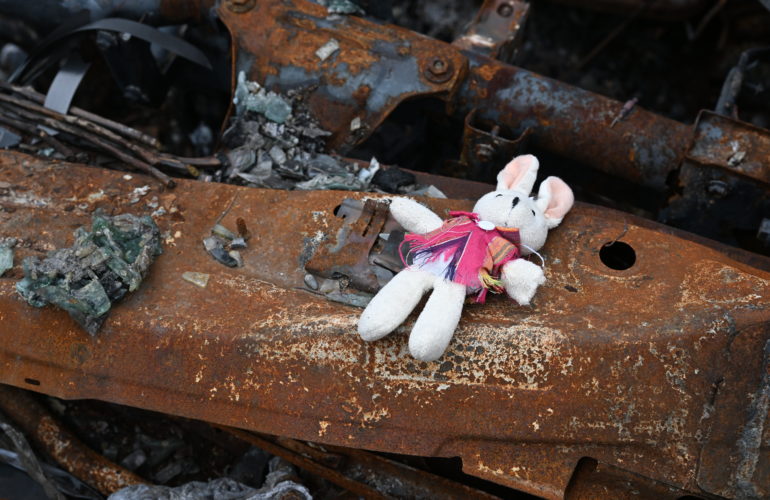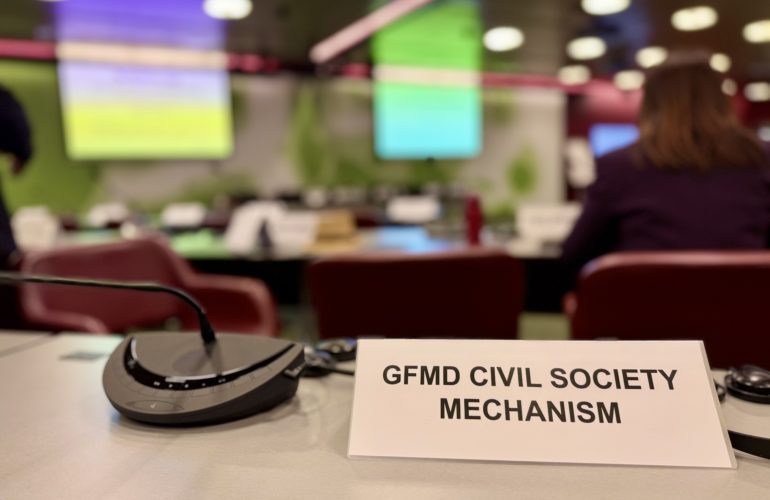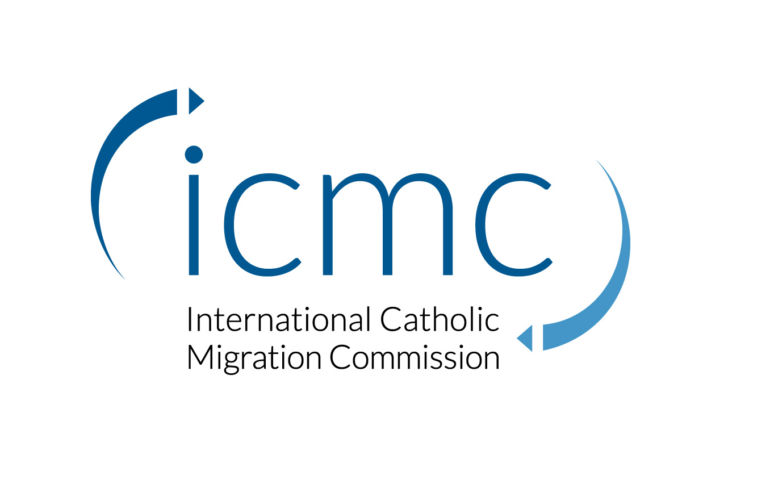ICMC Coordinates Civil Society Participation at the 14th Summit of the 2022-24 Global Forum on Migration and Development
The plight of missing migrants and their families, the role of migrants’ stories in shaping policies, and the importance of a dignified response to communities forced to migrate because of climate change were among the topics that civil society, coordinated by ICMC, brought to the table at the 14th GFMD Summit.
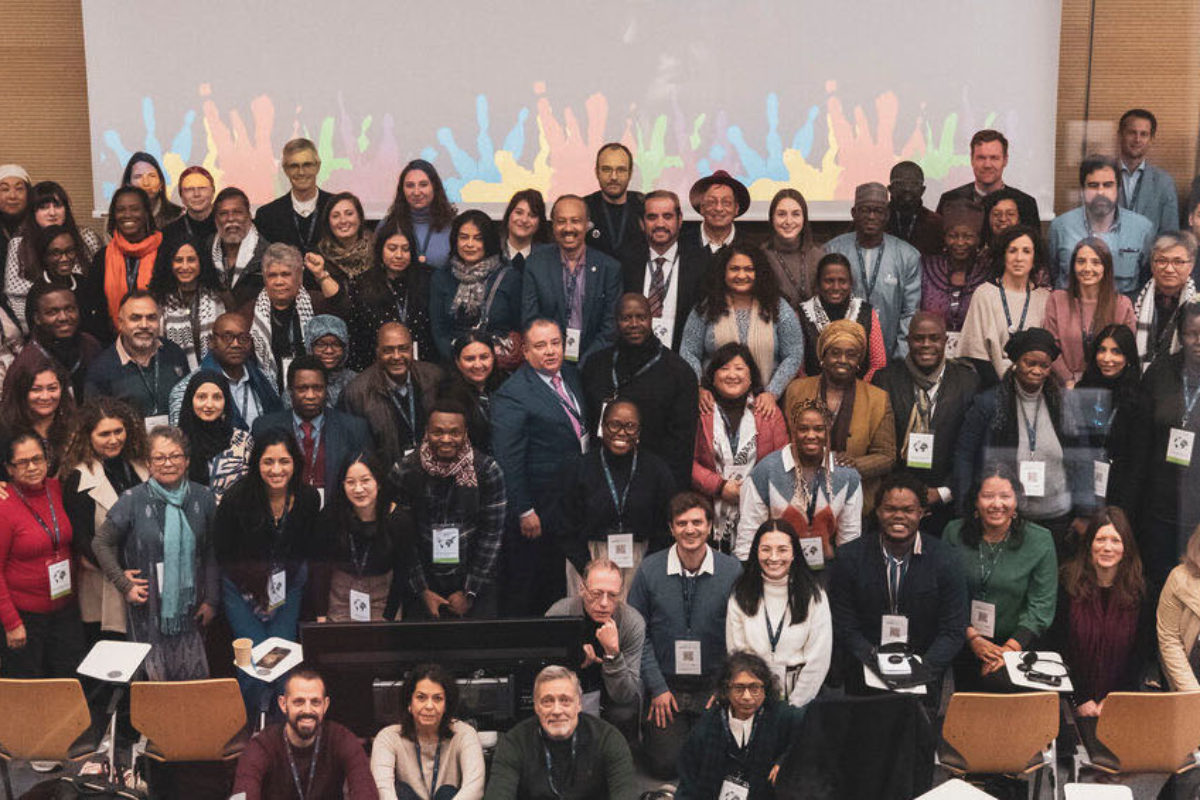
The 14th Summit of the 2022-24 Global Forum on Migration and Development (GFMD)* process, under the French Chairmanship, took place from 23 to 25 January 2024 in Geneva, Switzerland. Alongside representatives from member States, the Business and Mayors Mechanisms, and the Youth Stakeholder Network, 110 civil society delegates from around the world participated in the Summit as part of the GFMD Civil Society Mechanism coordinated by the International Catholic Migration Commission (ICMC).
Per the normal GFMD process, the French Chairmanship identified six thematic priorities to guide GFMD discussions: the central theme of ‘The Impact of Climate Change on Human Mobility,’ and five additional priorities (Rights, Diaspora, Labor migration, Migration narratives, and Multilevel governance).
Civil society priorities to take forward at the Summit were developed within these themes, and elaborated during preparatory meetings and discussions facilitated by the Civil Society Mechanism throughout 2022-24. The development process was launched in Abuja in early 2023. Key civil society priorities included:
- Maintaining a ‘right to stay’ for those in communities most affected by climate change, as a potential adaptation solution alongside migration.
- Challenging inaccurate predictions of mass migration caused by climate change.
- Ensuring sustainable funding and resources for migrants and refugees to participate in all areas of society, irrespective of legal status.
- Better supporting and communicating the many and varied contributions of diaspora communities, including in areas such as combating the impacts of climate change and strengthening the cultural life of destination countries.
- Establishing rights-based labor migration pathways, and ensuring state recognition of the right of migrant workers to organize collectively.
- Implementing a ‘Whole-of-Society’ approach across all levels of migration governance, through the meaningful inclusion of civil society, local government, and all other relevant stakeholders.
Complementing and extending GFMD discussions: Highlights from the Civil Society Mechanism at the Summit
Climate change and human mobility
At the GFMD Summit, the Civil Society Mechanism played a key role in discussions in this area, as co-chair for the cross-cutting thematic GFMD priority ‘The Impact of Climate Change on Human Mobility’ and a co-organizer of side event discussions addressing this issue.
With the governments of Fiji and Argentina, the Civil Society Mechanism co-chaired the 2023-24 GFMD government-led Roundtable** on climate change and human mobility.
At the Summit, civil society, represented by ICMC’s Elana Wong, took a leading role in convening and hosting the formal Roundtable discussion ‘The Impact of Climate Change on Human Mobility: Preventive Action, Humanitarian Action and Development’, which took place on 23 January.
Roundtable discussions focused on the three key areas identified by the GFMD Background Paper for this thematic priority: data, financing, and climate-resilient development and regular pathways. At the Summit, civil society delegates called for:
- Data: improving current data to better support evidence-based policymaking, providing investment to support improvements in national data collection, and ensuring more localized data collection involving local government and affected communities.
- Financing: prioritizing support for climate resilience in affected communities, mitigation measures for climate-vulnerable communities, and creative approaches to combining climate and migration financing.
- Development and regular pathways: taking a rights-based approach to climate adaptation and resilience, to ensure protection for those who choose to migrate, those who choose not to, and those who cannot.
The Civil Society Mechanism also co-organized the 24 January GFMD side event Regular Pathways in the Age of Climate Change: Blending Policy, People, and Art alongside the Platform on Disaster Displacement (PDD), Secours Catholique-Caritas France, and the Climate, Migration, and Displacement Platform (CMDP). Sponsored by the European Union and the governments of Fiji and Switzerland, the side event complemented and extended GFMD discussions on labor migration in the context of climate change by exploring how policy and development can respond to the communities most affected by slow-onset climate change, and the role of art in contextualizing migration narratives and providing alternative perspectives and innovative solutions.
Civil society side event contributions emphasized the extensive impacts of climate change in the absence of regular pathways.
Helena Olea of Alianza Americas pointed to a lack of global awareness of the precarity of many communities affected by climate change in the Global South. “Situations that in the Global North are assumed to be permanent and normal, such as having insurance for agriculture, are absolutely not normal in Latin America,” she said. “When people lose their annual crop due to flood or drought, they lose all of their resources and their capacity to survive for a whole year. This has a devastating impact.”
In these contexts, the absence of rights-based, regular labor migration pathways for climate-affected people has severe consequences for both migrants and affected communities at large. “Seventy percent of households within the Bangladesh coastal area have at least one family member who has migrated,” stated Mr. Islam. “They don’t have resources to participate in mainstream labor migration, which in any case have very limited space, so they follow a labor migration pathway that is very unprotected. They mainly move to the Gulf, where they are generally tied to a single employer, which leaves them highly vulnerable to abuse and exploitation.”
Civil society speakers and participants again raised the right for those affected by climate change to stay in their communities, a key priority for civil society at the Summit. “What we’re hearing from affected communities is ‘we want to stay, and to be able to have the right to stay’,” said 2022-24 GFMD civil society co-facilitator*** Marie Lobjoy of Secours Catholique-Caritas France in her later reflections on the GFMD process. “Shifting the narrative to incorporate this perspective was really important, and within the preparatory meetings and at the Summit, we emphasised that repeatedly.”
Mr. Islam pointed to the outcomes of OKUP research on mobility with affected communities in Bangladesh, which confirms this perspective. “Seventy percent of households don’t want to leave, because it’s our ancestral land, we have our own culture and communities, and we will lose this if we migrate,” he said. “We must ensure that a rights-based approach to labor migration incorporates this strong desire of affected communities to stay, and enables people to make an informed and free choice about migrating. It has to be a choice.”
Civil society made a strong call for policymaking to be anchored in the broader histories of affected global regions in relation to colonization and exploitation of resources. Bernie Goulding of the Pacific Women’s Indigenous Network (WIN) and Mamadou Goïta, representing the Pan African Network in the Defense of Migrants’ Rights (PANiDMR), used their interventions to map the histories of their regions in relation to climate change.
“Natural disasters that are not of our making have put us in the Pacific on the frontline of climate change,” Ms. Goulding stated. “We have been colonized and recolonized by Europeans, fought in your wars, and been the site for your weapons testing in peacetime. Then you came back to get our resources, and many Pacific Island States have now been decimated by resource theft. The resulting climate change is happening right in front of us: that’s what we’ve been left with.”
Mr. Goïta similarly charted the long history of slavery, colonization, and exploitation of resources across the African continent and particularly in West Africa, and the ways in which this past is inextricably linked to present-day climate change and its societal impacts.
Civil society contributions also focused on losses incurred by communities and individuals affected by climate change, highlighting in particular the need to take account of non-economic losses in the context of international efforts such as the Loss and Damage fund agreed upon at COP28.
Migration narratives
On the final day of the Summit, more than 40 GFMD delegates participated in the GFMD side event ‘How Civil Society is Changing Migration Narratives: From Multistakeholder Partnerships to Ethical Storytelling.’
Organized by the Civil Society Mechanism in collaboration with the U.S. government’s Bureau of Population, Refugees, and Migration (PRM), the GFMD Working Group on Public Narratives on Migration, and the International Centre for Migration Policy Development (ICMPD), the event focused on partnership and ethical storytelling, and highlighted how multistakeholder initiatives can produce words, images and actions that are true to migrants’ stories and realities.
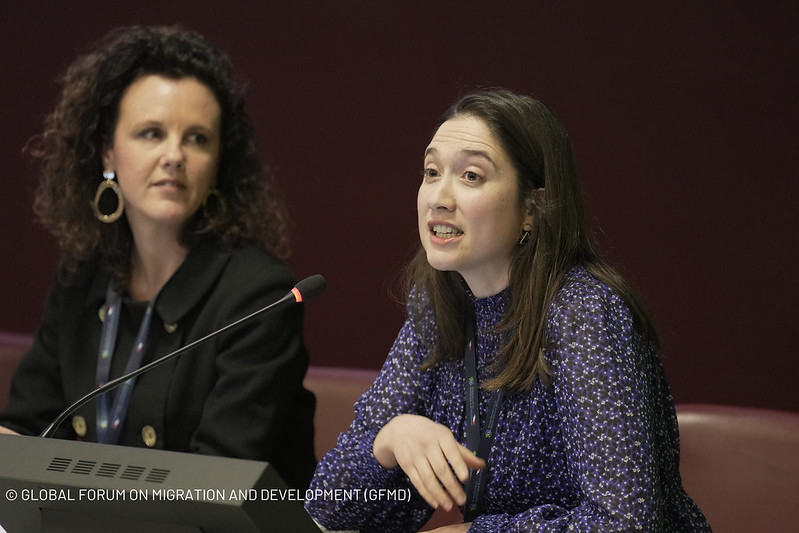
Here, civil society contributions emphasized centering migrant voices and considering migrant protection within efforts to change migration narratives. Of particular importance were ethical considerations for stakeholders seeking to tell migrant stories, including the need to avoid placing people at risk through storytelling, including involuntarily, and for vigilance in relation to triggering past trauma through the storytelling process.
“People on the move, those most in need and most marginalized are fearful to share their reality, with reason. They have learned to tell the stories that get the best response, to create cover stories that protect them and their families left behind,” said Nermin Ahmad of the NGO Committee on Migration at the event’s opening panel. “Can you imagine putting the family of someone on the move at risk of AI recognition, just to benefit from their stories?”
Civil society and other participants also strongly emphasized the importance of multistakeholder and multilevel partnerships for any action seeking narrative change, and the importance of action taken in proximity to citizens and communities for achieving this change. “Single actors can’t change narratives on their own, because we all have different perceptions,” said Paddy Siyanga Knudsen of the Global Research Forum on Diaspora and Transnationalism and the African Non-state Actors Platform on the GFMD. “The fact that this topic is a priority in an international space like the GFMD is hugely positive, as is the strong engagement of civil society alongside local government. It’s crucial to provide spaces to share and collaborate across all stakeholders, at all levels.”
Looking to the future: civil society space at the GFMD
Civil society participation at the 14th GFMD Summit faced a number of challenges, including difficulties for some delegates from the Global South to obtain visas, and limitations on the number of civil society delegates permitted to attend roundtable discussions.
“It was difficult to explain to our constituency some of the limitations imposed on civil society’s participation, given that the GFMD has a long tradition of honest and friendly interface between governments and civil society,” says Stéphane Jaquemet, ICMC Chief Operating Officer and Director of Policy. “In the end, we appreciated the on-the-spot flexibility shown by the Chair in finally allowing many more into the room than the prior limitations had indicated. With civil society and other non-state representatives there, the discussions reflected the reality on the ground.”
Mamadou Goïta, another of the four GFMD civil society facilitators, is keen to draw positive lessons for civil society in this context. “The biggest lesson is that without communication on the needs of all stakeholders, it’s difficult to make decisions on how the process will work,” he says. “So we are starting now, by engaging the incoming Colombian Chair in those discussions on participation.”
For Mr Jaquemet, challenges related to participation at the 14th GFMD Summit served to underline the strength of the civil society delegation coordinated by the Civil Society Mechanism. “What I find remarkable is that these difficulties, instead of discouraging civil society, made it more resilient,” he reflects. “Its fighting spirit, its faith in a better world, its belief in human dignity, respect for human rights, and migrants’ agency, were not only unaltered but were stronger than ever. Most people in a similar situation would have given up, but not our civil society participants.”
* The Global Forum on Migration and Development (GFMD) is a government-led initiative that brings together member states, local government, business representatives, and civil society organizations concerned with migration and development issues. Its goal is to discuss a range of topics on migration, propose innovative solutions, share policy ideas, and create partnerships and cooperation in an informal dialogue setting.
** Government-led Roundtables are the key GFMD process for the consultative and collaborative work, undertaken during the preparation for each Summit, on the thematic priorities selected under each GFMD chairmanship. GRTs are State-led, and engage the CSM, Business and Mayors Mechanisms, Migration Youth and Children Platform (MYCP), international organizations, academics, development partners, and other stakeholders to provide thematic inputs and assist in the preparation and review of GRT background papers.
*** The four 2022-24 GFMD civil society co-facilitators were Mamadou Goïta (Pan African Network in the Defense of Migrants’ Rights, PANiDMR), Marie Lobjoy (Secours Catholique-Caritas France), Brice Monnou (Forum of International Solidarity Organizations for Migration, FORIM), and Valentina Origoni (Secours Islamique France).

Rachel Westerby
Independent writer and researcher on migration and refugees.
